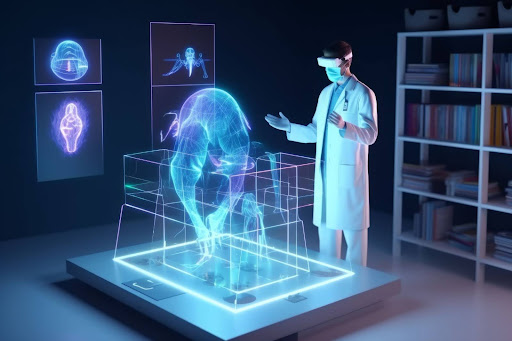7 Common and Serious Side Effects of Airsupra
Understanding Airsupra Side EffectsAirsupra is a prescription inhaler used as a rescue medication to relieve asthma symptoms in adults aged 18 years and older. It is not [...]
Read More
Medically reviewed by Alan Lucks | MD, Alan Lucks MDPC Private Practice - New York on June 17th, 2025.
AI diagnostic systems can analyze medical imaging 30% faster than human radiologists and reduce diagnostic errors by up to 20%, particularly excelling at pattern recognition in X-rays, MRIs, and CT scans.
Robotic surgical assistants like da Vinci systems allow surgeons to perform minimally invasive procedures with 3mm precision, resulting in 50% smaller incisions and faster patient recovery times.
Algorithmic bias poses significant risks when AI systems are trained on data that underrepresents certain populations, potentially worsening existing healthcare disparities for minority and underserved communities.
Administrative AI can process insurance claims and schedule appointments automatically, freeing physicians to spend an additional 2-3 hours daily on direct patient care instead of paperwork.
Medical schools are now requiring AI literacy courses as core curriculum, teaching future doctors to interpret machine learning outputs and maintain clinical judgment when algorithms provide conflicting recommendations.
The rapid advancement of technology has led to significant changes in various sectors, and healthcare is no exception. The emergence of artificial intelligence (AI) in medicine has sparked debates about its potential to replace human doctors.
This article explores the capabilities of doctor AI in healthcare, the advantages and challenges it presents, and the future of the doctor-patient relationship in an increasingly automated world.
 The Rise of AI in Healthcare
The Rise of AI in HealthcareArtificial intelligence has made remarkable strides in recent years, with applications ranging from diagnostic tools to robotic surgeries. Integrating AI into healthcare systems aims to improve patient care, streamline processes, and reduce costs.
AI technologies are being utilized in various areas of medicine, including:
Diagnostic Assistance: AI algorithms can analyze medical images, lab results, and patient histories to help doctors diagnose conditions more accurately and quickly.
Predictive Analytics: By examining large datasets, AI can identify patterns and predict potential health risks, enabling preventive measures.
Personalized Treatment Plans: AI can analyze individual patient data to recommend tailored treatment options, improving outcomes.
Robotic systems, often powered by AI, are revolutionizing surgical procedures. These systems provide surgeons with improved precision, reduced recovery times, and minimized risks of complications. Automation in administrative tasks, such as scheduling and billing, also frees up healthcare professionals to focus more on patient care.
Moreover, the use of AI in robotic surgery extends beyond precision; it also enables minimally invasive techniques that can significantly reduce the trauma associated with traditional surgeries.
For example, AI-assisted robotic systems can perform complex procedures through tiny incisions, leading to less pain and quicker recovery for patients. Additionally, these systems can learn from each procedure, continuously improving their performance and outcomes based on real-time data and feedback.
In the realm of patient management, AI-driven chatbots and virtual health assistants are becoming increasingly prevalent. These tools can provide patients with immediate responses to their inquiries, assist in symptom checking, and even remind them to take medications.
By leveraging natural language processing, these AI applications can engage with patients conversationally, making healthcare more accessible and efficient. As these technologies evolve, they hold the potential to bridge gaps in healthcare access, particularly in underserved communities.
AI offers numerous benefits that can improve the healthcare experience for both patients and providers. Understanding these advantages is crucial to evaluating AI's role in the future of medicine.
One of the primary advantages of AI is its ability to process vast amounts of data quickly and accurately. This capability allows for:
Faster Diagnoses: AI can analyze symptoms and medical histories in seconds, often identifying conditions that may take human doctors longer to diagnose.
Reduced Errors: By relying on data-driven algorithms, AI can minimize human errors in diagnosis and treatment recommendations.
Moreover, AI systems can continuously learn from new data, which means they can adapt to emerging medical knowledge and trends. This ongoing learning process improves their diagnostic capabilities over time, making them increasingly reliable.
For example, machine learning algorithms can identify patterns in imaging data, such as X-rays or MRIs, that might be imperceptible to the human eye, leading to earlier detection of diseases like cancer.
AI has the potential to significantly reduce healthcare costs. By streamlining operations and improving diagnostic accuracy, AI can lead to:
Lower Treatment Costs: Early diagnosis and personalized treatment plans can prevent complications, thereby reducing the need for expensive interventions.
Decreased Administrative Expenses: Automation of routine tasks can cut down on labor costs and improve overall efficiency.
In addition to direct cost savings, AI can also improve resource allocation within healthcare systems. By predicting patient inflow and optimizing staff schedules, AI can ensure that healthcare facilities are adequately staffed during peak times, thus preventing burnout among healthcare workers and maintaining high-quality patient care.
Furthermore, AI-driven analytics can help identify areas where resources are being underutilized, allowing for better strategic planning and investment in critical areas of need.
Despite its advantages, integrating doctor AI in healthcare is not without challenges. Addressing these limitations is vital for the responsible adoption of AI technologies.
The use of AI in healthcare raises several ethical questions, including:
Data Privacy: The collection and analysis of patient data by AI systems pose significant privacy concerns. Ensuring that patient information is secure and used ethically is paramount.
Bias in Algorithms: AI systems can inadvertently perpetuate biases present in training data, leading to disparities in care for certain populations.
Moreover, the transparency of AI algorithms is a growing concern. Many AI systems operate as "black boxes," meaning their decision-making processes are not easily understood by healthcare professionals or patients.
This lack of transparency can lead to mistrust in AI recommendations, particularly when patients are faced with critical health decisions. Additionally, the responsibility for decisions made by AI systems remains ambiguous; questions arise about who is liable when an AI system makes an error that affects patient care.
As healthcare increasingly incorporates AI, there is a risk of over-reliance on technology. This can result in:
Decreased Human Interaction: The doctor-patient relationship may suffer if AI systems replace face-to-face consultations.
Loss of Critical Thinking Skills: Young doctors may become overly dependent on AI for decision-making, potentially hindering their ability to think critically.
Furthermore, an over-reliance on AI can lead to a disconnect between healthcare providers and their patients. When technology mediates interactions, the nuances of patient emotions and concerns may be overlooked, which could affect the quality of care.
In addition, the rapid pace of technological advancement means that healthcare professionals must continuously update their skills and knowledge. This can create a significant burden, particularly for those who may not be as tech-savvy, potentially widening the gap between different healthcare providers and impacting overall patient care.
 While AI has the potential to transform healthcare, it is unlikely to completely replace human doctors. Instead, the future may see a collaborative model where AI and healthcare professionals work together to improve patient outcomes.
While AI has the potential to transform healthcare, it is unlikely to completely replace human doctors. Instead, the future may see a collaborative model where AI and healthcare professionals work together to improve patient outcomes.
AI can serve as a powerful tool to assist doctors rather than replace them. This collaboration allows healthcare professionals to:
Focus on Patient Care: With AI handling administrative and diagnostic tasks, doctors can dedicate more time to direct patient interaction and care.
Improve Decision-Making: AI can provide data-driven insights, enabling doctors to make more informed decisions regarding treatment options.
As AI technologies evolve, medical education must adapt to prepare future healthcare professionals. This includes:
Integrating AI into Curricula: Medical schools should incorporate training on AI tools and their applications in healthcare.
Fostering Interdisciplinary Collaboration: Encouraging collaboration between healthcare professionals and data scientists can lead to better AI solutions tailored for medical use.
Moreover, integrating AI into medical training can also improve students' understanding of ethical considerations surrounding AI use.
As AI systems become more prevalent in diagnostics and treatment recommendations, future doctors must be equipped to critically evaluate their implications. This includes understanding biases in AI algorithms, patient privacy concerns, and the importance of maintaining a human touch in patient interactions.
By addressing these ethical dimensions, medical education can ensure that the next generation of healthcare providers is not only technologically adept but also socially responsible.
In addition to training, ongoing professional development will be crucial for current healthcare providers. As AI tools continue to advance, doctors will need to stay informed about the latest technologies and best practices for integrating them into clinical settings.
This could involve workshops, online courses, and collaborative projects that allow healthcare professionals to share experiences and insights. By fostering a culture of continuous learning, the healthcare industry can ensure that doctors remain at the forefront of patient care, leveraging AI to improve their expertise rather than diminish it.
The future of healthcare may lie in a hybrid model that combines AI's strengths with human doctors' irreplaceable qualities. This model could lead to a more efficient, effective, and patient-centered healthcare system.
By leveraging AI to handle routine tasks and diagnostics, healthcare providers can improve the overall patient experience. This includes:
More Time for Patients: Doctors can spend more time listening to patients, understanding their concerns, and providing personalized care.
Improved Accessibility: AI-driven telemedicine solutions can make healthcare more accessible, especially for those in remote areas.
Moreover, the use of AI can streamline administrative processes, reducing the burden of paperwork that often detracts from patient interaction.
For example, automated scheduling systems can handle appointment bookings, reminders, and follow-ups, allowing healthcare professionals to focus on what truly matters: patient care. This not only improves the efficiency of healthcare delivery but also fosters a more empathetic and responsive environment where patients feel valued and understood.
The integration of AI in healthcare also allows for continuous learning and improvement. AI systems can analyze outcomes and feedback to refine their algorithms, leading to:
Better Treatment Protocols: As more data is collected, AI can help identify the most effective treatment protocols for various conditions.
Real-Time Monitoring: AI can facilitate real-time monitoring of patients, allowing for timely interventions when necessary.
Additionally, AI's ability to process vast amounts of data can lead to breakthroughs in predictive analytics. By analyzing trends and patterns in patient data, AI can help healthcare providers anticipate potential health crises before they occur, enabling proactive rather than reactive care.
This shift not only improves patient outcomes but also optimizes resource allocation within healthcare systems, ensuring that interventions are timely and effective. As healthcare continues to evolve, the synergy between AI and human expertise will be crucial in navigating the complexities of patient care and improving overall public health.
Will smart machines replace real doctors? Probably not. Doctronic can make healthcare faster and more accurate, but it can’t replace a doctor’s care, empathy, or experience. Instead, they work best with doctors, not instead of them. As this article shows, the future of healthcare is about teamwork, combining the power of technology with the human touch to give patients the best care possible.
The future of medicine involves AI handling routine diagnostics and administrative tasks while doctors focus on complex decision-making, patient relationships, and personalized care planning. This collaborative approach promises better outcomes without losing the human empathy essential to healing. If you have questions about how AI might impact your healthcare experience, Doctronic can provide personalized guidance.
Understanding Airsupra Side EffectsAirsupra is a prescription inhaler used as a rescue medication to relieve asthma symptoms in adults aged 18 years and older. It is not [...]
Read MoreUnderstanding Budesonide Interactions for Safe UsageBudesonide is a corticosteroid medication used to treat conditions like asthma, Crohn's disease, and ulcerative [...]
Read MoreUnderstanding Xolair Interactions for Safe UsageXolair (omalizumab) treats severe allergic asthma, chronic hives, and nasal polyps. When starting this medication, patients [...]
Read More